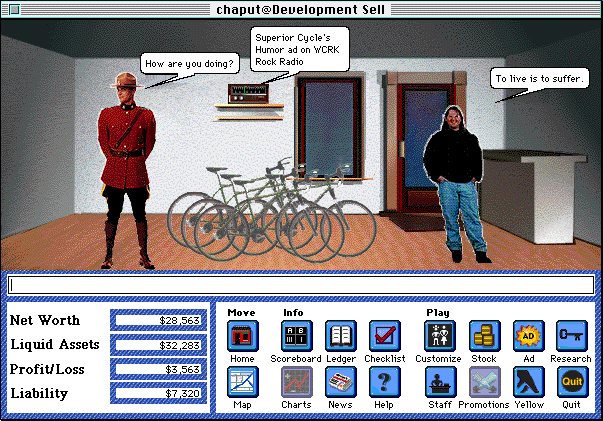
The main
window in Sell
The
ILS Sell game was implemented with a Unix-based Sell Server and a
Macintosh-based graphical client program. After using the client program
to connect to the Sell Server, this is the main window you saw. It
consisted of two major sections. The top part is the MOOPort, and
the bottom part is the dashboard.
The
MOOPort
The MOOPort is a window into the virtual town
of Springfield, where players could see their store, other players,
and all things involved in the community aspect of Sell.
The
Dashboard
This part of the main window gave information about
Springfield and the players' stores, and let them change various aspects
of the store.
Net
Worth, Liquid Assets, Profit/Loss, and Liability
These status boxes showed net worth
(in terms of cash and merchandise), liquid assets (cash on hand),
profit or loss (in terms of money made or lost since the beginning
of the game, and libilities (how much is owed).
Home
and Map
Pressing these buttons moved players
to predefined sections of the game, specifically the store and the
Map Room. Linear movement was done through the MOOPort.
Scoreboard
Pressing this button brings up the
scoreboard, a list of the players and where they stood in the game
(this was never implemented graphically).
Ledger
Pressing this button brought up a ledger
with an account of all income and expenditures (this was never implemented
graphically).
Checklist
Since Sell is supposed to teach players
how to run a store, it keeps track of the actions a player had taken
and also the actions not taken. Pressing the checklist button brought
up the checklist, listing the moves made, and the moves to think
about taking in the near future (this was never implemented graphically).
Charts
Closely related to the Ledger, the
Charts window was intended to graphically display which products were
bringing in the most profit, and which expenses were egregious. It
also was intended to give this information projected into the future,
to assist in planning and promote more intelligent retail decisions
(this was never implemented).
News
This is the daily newspaper -- information
about Springfield was displayed here, which could have an impact on
retail decisions. Also, the ads placed in the newspaper showed up
here (this was never implemented graphically).
Help
This help button, available on almost
every window, went to the on-line help browser.
Customize
The Customize Window allowed players
to change their appearance, name, and the name of their store.
Stock
This button allowed players to see
and manipulate their inventory.
Ad
The Ad Builder, was for placing ads
and reviewing ads that were running.
Research
This button was to research the market,
in terms of who buys what products and where to place ads to reach
them most effectively.
Staff
A window where players could hire,
train, and fire salespeople to work in their store (never fully implemented).
Promotions
This button was to let players participate
in store promotions, like sales and sponsering little league teams
(never implemented).
Yellow
This window brought up the business-to-business
yellow pages. Players would browse the yellow pages for a wholesaler
that sold the products they wanted to buy.
Quit
This button logged out of the Sell
Server.